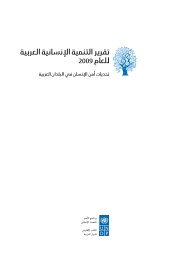CHANGES IN HUMANDEVELOPMENT SINCE 2001THE REGIONAL ANDINTERNATIONAL ENVIRONMENTWork on the first AHDR (2002) started at thebeginning of 2001; as such its analysis stoppedat the end of the twentieth century. On theother hand, since the first draft of this second<strong>report</strong> was initiated at the beginning of <strong>2003</strong>,the timeframe under review in this section islimited to just two calendar years. This is, ofcourse, a very short period in <strong>human</strong> <strong>development</strong>terms. Basic <strong>human</strong> <strong>development</strong> indicatorsdo not change significantly over shortperiods. Moreover, updating such indicatorsrequires up-to-date databases, resources thatare all-too-scarce in the Arab world, as wassharply underlined in the first <strong>report</strong>.In an attempt to maximise informationbased on weak or incomplete data, this sectionadopts a qualitative analysis. It focuses on deducingtrends inherent in events considered tohave an important bearing on various dimensionsof <strong>human</strong> <strong>development</strong> in the regionaland international context of Arab countries.At the time of writing, trends portend momentousalterations that may change not only thestatus of <strong>human</strong> <strong>development</strong>, but the veryface and pattern of life in the region for someconsiderable time.Certain events may take place over a veryshort period of time, yet leave a profound impressionon <strong>human</strong> <strong>development</strong>. Such is thecase with changes in <strong>human</strong> rights and otherforms of legislation affecting people’s civil liberties.This section records several recentevents that have had negative impacts in Arabcountries, notably in the two areas of freedomand good governance and the advancement ofwomen.Furthermore, qualitative analysis also requiressound and comprehensive data. Mostof the databases available to support suchanalysis reflect the viewpoints, if not the prejudices,of the party gathering the data. To minimisethis problem, especially in relation toArab-related events, the authors have resortedto more than one source besides diligentlymonitoring the mass media during the periodunder study, including bulletins and <strong>report</strong>sprepared by the Arab Organisation forHuman Rights, and electronic mail lists of<strong>human</strong> rights violations in Arab countries.ON THE INTERNATIONAL ANDREGIONAL DIMENSIONS OFHUMAN DEVELOPMENT IN ARABCOUNTRIESThe first AHDR (2002) may not havegiven sufficient attention to the regional andinternational dimensions of the <strong>human</strong> <strong>development</strong>impasse in Arab countries – at least,this is what a majority of the Arab critics of the<strong>report</strong> have felt. The publication of the <strong>report</strong>after the tragic events of September 11, 2001,and their extremely serious aftermath, amplifiedthis feeling, although work on the <strong>report</strong>had started well before those events.The authors believe that exaggerating theimpediments to Arab <strong>development</strong> imposedby regional and international challenges is futileand self-defeating. This all-too-frequentresort may provide a comforting escape, yet itis still highly counterproductive. Takingrefuge in externalities weakens the resolve andundermines the capabilities required for selfreliant<strong>development</strong>. It also leads to underestimatingthe task of self-improvement uponwhich Arab dignity and the national, regionaland international prospects of the region mustbe constructed. Hence, the strategic choice ofthe first <strong>report</strong> was to focus on the reform requiredwithin the Arab world.The decisive factor in soundly confrontingthe regional and international challenges facingthe Arab world will be the quality of Arabcapabilities in various spheres; knowledge,production and politics. Such capabilities andcreative energies, in turn, cannot be unleashedwithout widening the range of people’s freedomsand guaranteeing good governance inpractice. History and logic further indicatethat a strong system of Arab co-ordinationleading to regional integration will be an indispensablesource of strength and a conditionfor success in these endeavours. This systemcan be seen as "an Arab Free CitizenshipZone", where every Arab would enjoy the fullrights of a national in each and every Arabcountry. Such a system would undoubtedlyThe decisive factor insoundly confrontingthe regional andinternationalchallenges facing theArab world will be thequality of Arabcapabilities inknowledge,production andpolitics.PART I: CHANGES IN HUMAN DEVELOPMENT IN ARAB COUNTRIES DURING 2001-2002 21
Governments, statingconsiderations ofsecurity and stability,have found a newjustification for theirongoing warningsabout the perils offreedom.strengthen the negotiating capacities of Arabcountries in highly competitive global arenas,and position Arab countries on firmer andhigher ground in the third millennium.It is now clear that the <strong>human</strong> impact ofSeptember 11 and its political and securityconsequences have decisively altered internationalpublic opinion and sentiment, and thusthe parameters of the external challenges to<strong>development</strong> in the Arab region. A new historicalera is rapidly unfolding; not only becauseof the high <strong>human</strong> toll, which was a greattragedy, but also because of the political andsecurity consequences of that cataclysm. Thefateful events of that horrific day woke theworld, especially its rich and powerful countries,from a dream of comprehensive securityand invulnerability. The need to rebuild globalsecurity has become all the more urgent now,yet the proposed means to reach this end vary.Without question, the killing of innocent<strong>human</strong> beings violated all <strong>human</strong> and heavenlylaws.Worldwide anti-terrorism policies havebeen largely military and security-oriented innature. The long-term goal of draining theeconomic and political sources of terrorismhas almost faded away.In the current war against terror, the securitypolicies and restrictive procedures introducedby some advanced countries andadopted in several parts of the developingworld, including the Arab region, have createda situation inimical to <strong>human</strong> <strong>development</strong>.Governments, stating considerations of securityand stability, have found a new justificationfor their ongoing warnings about theperils of freedom. A flawed yet highly influentialrationale has gained ground: if the world’sleading democracies find it necessary to backpedalon <strong>human</strong> rights and civil liberties, otherstates much further behind on the road to reformmay be well advised to pause. After all,in the narrow logic of security, governmentswith the most to lose by granting freedom arethus most justified in ruling with an iron grip.The expedience of that logic has not been loston regressive elements in Arab and other developingcountries.Events befalling Arabs abroad and widelybroadcast in the media intensified popular disaffectionin the region. The US Administrationresorted to establishing and enforcing proceduresthat at times contravened the most basic<strong>human</strong> rights, according to the (American)Lawyer’s Committee for Human Rights (NewYork, 2002), which found that "over the lastyear the US government has taken a series ofactions that have gradually eroded basic<strong>human</strong> rights protections in the United States,fundamental guarantees that have been centralto the US constitutional system for more thantwo hundred years...too often, the US government’smode of operations since September 11has been at odds with core American and international<strong>human</strong> rights principles." 4 Thoseprocedures, which included ethnic profilingand secret evidence, violated civil and politicalliberties, particularly those of Arabs andMuslims. They revoked the right to a just trialbefore civil courts, thus legalising detentionwithout charge and administrative arrestswithout due process.The US introduced ethnic profiling ofArabs and Muslims, whether they were naturalisedcitizens, legal residents, students or visitors.Contrary to a long-established principleunder the law, these people became guiltyuntil proven innocent. Many ordinary peoplewere arrested for no reason except their affiliationto Arabs or to Islam. The US requiredfingerprint records of visiting nationals from25 Arab states and also instituted registrationwith security forces, which led to administrativedetentions in some cases.These measures resulted in reducing thenumber of Arab students in the United States,quite markedly in the cases of some countries(Table 1). Important knowledge acquisitionopportunities for young Arabs were thus cur-4The American Lawyer’s Committee for Human Rights <strong>report</strong> (New York, 2002) documents details of the erosion of civil liberties. Among them:• "The FBI may now be privy to what books an individual checks out at the public library or purchases at the local bookstore.• The USA Patriot Act could result in long-term detention of non-citizens who have never been charged with a crime.• The Justice Department’s list of the young men targeted for government questioning was compiled strictly on the basis of national origin.• The Administration has in fact been using the term "unlawful enemy combatant" - a term not found in international law - as a kind of magicwand, waving it to avoid well-established standards of the US and international law.• Even if suspected terrorists are eventually tried and then acquitted by military commissions the Administration reserves the right to continue todetain them indefinitely.• In too many cases, opportunistic governments expressed support for the fight against terrorism, while presenting their own domestic insurgencies as conflicts perpetrated by terrorist groups analogous to at least Al-Qaeda."22 ARAB HUMAN DEVELOPMENT REPORT <strong>2003</strong>
- Page 2 and 3: United Nations Development Programm
- Page 5 and 6: Immersion, yes, but swamped or drow
- Page 7 and 8: level of development, help all its
- Page 9 and 10: interrelated issues in some depth.
- Page 11: ABBREVIATIONS AND ACRONYMSAFTAAHDIA
- Page 14 and 15: The Arab knowledge civilisation: so
- Page 16 and 17: Cultural interaction129CHAPTER 7SOC
- Page 18 and 19: 7.1 Patriarchal Society in Arab Cou
- Page 20 and 21: EXECUTIVE SUMMARYThe first Arab Hum
- Page 22 and 23: nowadays can provide the means to e
- Page 24 and 25: presence of significant human capit
- Page 26 and 27: movements with an Islamic mark unde
- Page 29 and 30: Arab citizens areincreasingly pushe
- Page 31 and 32: Constitutions, lawsand administrati
- Page 33 and 34: PART IChanges in human development
- Page 35 and 36: The challenge ofbuilding humandevel
- Page 37: The AHDR was a bellthat rang at the
- Page 41 and 42: BOX 6Human Rights Watch Report 2002
- Page 43 and 44: Occupation posed toIraqis a new cha
- Page 45 and 46: Arab countries, onaverage, continue
- Page 47 and 48: In most Arab countriesthe march of
- Page 49 and 50: The core challenges tohuman develop
- Page 51 and 52: CHAPTER 1Conceptual framework: know
- Page 53 and 54: level of society, between knowledge
- Page 55 and 56: it. As such, the returns to knowled
- Page 57 and 58: knowledge vary and interact, especi
- Page 59 and 60: of calculation systems and the util
- Page 61 and 62: BOX 1.5Ahmad Kamal Aboulmagd: Towar
- Page 63 and 64: Figure 1.4PC availability and Inter
- Page 65 and 66: PART IISection two: the state of kn
- Page 67 and 68: The most seriousproblem facing Arab
- Page 69 and 70: Communication ineducation is didact
- Page 71 and 72: One of the mainfeatures of manyuniv
- Page 73 and 74: The evaluation indicates that priva
- Page 75 and 76: Official Arab satellitechannels dom
- Page 77 and 78: The harassment ofthe press under th
- Page 79 and 80: Figure 2.7Personal computers: Arab
- Page 81 and 82: There is clearly alarger role for t
- Page 83 and 84: ooks for translation in order to fu
- Page 85 and 86: Arabic research activitycontinues t
- Page 87 and 88: Workers in scientific research andd
- Page 89 and 90:
TABLE 3.3Number of scientific resea
- Page 91 and 92:
Restricting intellectualfreedom is
- Page 93 and 94:
Figure 3.3Number of publications -
- Page 95 and 96:
when economic crises and security c
- Page 97 and 98:
The main threat to freeliterature a
- Page 99 and 100:
CHAPTER 4Measuring knowledge capita
- Page 101 and 102:
noted, the current attempt to measu
- Page 103 and 104:
esearch and development and arts pr
- Page 105 and 106:
velopment. Does the disparity in hu
- Page 107 and 108:
ple)7. Book titles (per million peo
- Page 109 and 110:
Despite the methodological and othe
- Page 111 and 112:
Figure 5.1:Actors and linkages in t
- Page 113 and 114:
Industrial R&Dinstitutions are weak
- Page 115 and 116:
Until Arab countriesdevelop andseam
- Page 117 and 118:
Governments havelarge responsibilit
- Page 119 and 120:
sibilities of information and commu
- Page 121 and 122:
Joint Euro-Arab R&Dactivities in th
- Page 123 and 124:
PART IISection three: the cultural,
- Page 125 and 126:
The issue of Arabintellectual herit
- Page 127 and 128:
The Arab mentality (is)a system tha
- Page 129 and 130:
Heritage has been adynamic contribu
- Page 131 and 132:
BOX 6.3Al Kawakibi (1854-1902) Desp
- Page 133 and 134:
The Arabic language isthe distincti
- Page 135 and 136:
BOX 6.8Arab North Africa - Language
- Page 137 and 138:
The re-birth of theArabic language
- Page 139 and 140:
Traditionaloccupations and craftsar
- Page 141 and 142:
Arab contemporaryculture is general
- Page 143 and 144:
CHAPTER 7Socio-economic structureTh
- Page 145 and 146:
tivities.The first consequence of t
- Page 147 and 148:
also narrowed markets. Yet it is wo
- Page 149 and 150:
The volume of Arab capital invested
- Page 151 and 152:
BOX 7.1Patriarchal Society in Arab
- Page 153 and 154:
amid the contraction of domestic ec
- Page 155 and 156:
knowledge societies in Arab countri
- Page 157 and 158:
The isolation ofcultural elites has
- Page 159 and 160:
The goal should be toinstitutionali
- Page 161 and 162:
BOX 8.3Imam Muhammad Abduh(1849-190
- Page 163 and 164:
Penalties meted out tojournalists,
- Page 165 and 166:
Disregard forintellectual propertyp
- Page 167 and 168:
Concerns that theworld economicsyst
- Page 169 and 170:
BOX 8.6Trade and Development: Prebi
- Page 171 and 172:
CHAPTER 9A strategic vision: the fi
- Page 173 and 174:
1. UNLEASHING ANDGUARANTEEING THE K
- Page 175 and 176:
certed efforts of the state, civil
- Page 177 and 178:
programmes of higher education inst
- Page 179 and 180:
also initiate innovation: it could
- Page 181 and 182:
BOX 9.4Imams (religious leaders) ad
- Page 183 and 184:
cially useful in the production of
- Page 185 and 186:
just one external point of referenc
- Page 187 and 188:
ReferencesEnglish ReferencesAmnesty
- Page 189 and 190:
Egyptian Sociology". National Centr
- Page 191 and 192:
Maalouf, Amin, 2001.In the Name of
- Page 193 and 194:
Fasl Al-Makal fi Taqrir ma bain Al-
- Page 195 and 196:
Clovis Maksoud, Introduction to the
- Page 197 and 198:
Elements of opinion survey of Arab
- Page 199 and 200:
Table A-1NET ENROLMENT RATIOS (%) I
- Page 201 and 202:
Table A-5PUPILS PER TEACHER RATIO B
- Page 203 and 204:
Table A-9RELATIVE DISTRIBUTION OF T
- Page 205 and 206:
198 ARAB HUMAN DEVELOPMENT REPORT 2
- Page 207 and 208:
Table A-10VALUES OF INDICATORS ON K
- Page 209 and 210:
202 ARAB HUMAN DEVELOPMENT REPORT 2
- Page 211 and 212:
204 ARAB HUMAN DEVELOPMENT REPORT 2
- Page 213 and 214:
206 ARAB HUMAN DEVELOPMENT REPORT 2
- Page 215 and 216:
208 ARAB HUMAN DEVELOPMENT REPORT 2
- Page 217:
Table A-13VALUES OF KNOWLEDGE OUTCO







